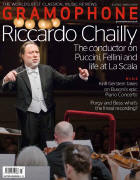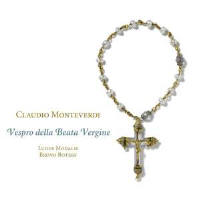Texte paru dans: / Appeared in: |
|
|
Outil de traduction (Très approximatif) |
|
|
Reviewer:
David Vickers A few aspects of Ludus Modalis’s interpretation are anachronistic – such as bowed bass viol continuo in solo pieces (not normal practice in early 17th-century Italy), soloistic passages sometimes sung by multiple singers on a part (particularly those lines sustaining a cantus firmus), and chiavette clefs are ignored in the six-voice version of the Magnificat (its implausibly high range is nevertheless executed beautifully). Plainchant antiphons are sung either side of the psalms but the alternating solo pieces, motets and the hymn were surely never intended to be performed in their published sequence during an actual Vespers service; the remainder of liturgical proceedings after the Magnificat is absent. This thoughtful and enjoyable performance is essentially another modern day reinvention of Monteverdi’s fascinating masterpiece. Bruno Boterf writes that his conception is ‘closer to the polyphonic world of Palestrina and the Franco-Flemish masters’. Thirteen singers are accompanied by an unusually prevalent church organ modelled after an early 17th-century Italian instrument by Costanzo Antegnati (whose family built and maintained the organ at Santa Barbara in Mantua); a compelling variety of rich registrations are played fulsomely by Anne-Marie Blondel. Jean-Luc Ho alternates between two harpsichords (one strung with gut, the other with brass), contributing distinctive textures – nowhere more so than in ‘Nigra sum’ (sung ardently by Boterf) and ‘Duo Seraphim’ (the momentum of the rich continuo realisation detracts slightly from the mysticism when the third tenor joins at the line ‘Tres sunt, qui testimonium dant in coelo’). There are no theorbos but bass sackbut, bass cornett and bass viol are often at the forefront on the bass part (this alternative Vespers is not quite as unaccompanied as it could have been). The instrumentally rich ‘Sonata sopra Sancta Maria’ is replaced by an adaptation of a ricercare by Frescobaldi. Even if their fresh approach risks feeling like playing tennis without a net, Ludus Modalis conjure a dazzling range of fascinating sonorities. |
|




